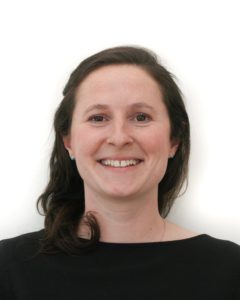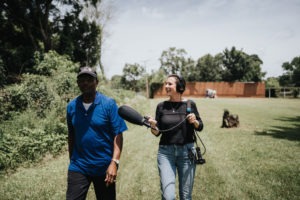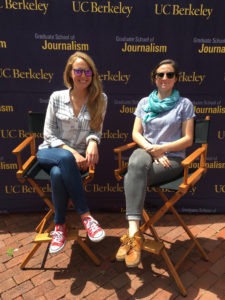
Parker Yesko (’16) always knew she wanted to be a criminal justice reporter. But she never would have predicted that just two years out of journalism school, her work would help to overturn a murder conviction and set a man free.
About a year after graduating from Berkeley Journalism, Yesko landed a job as an investigative reporter at APM Reports’ “In the Dark” podcast. She immediately began reporting for Season 2, which focused on Curtis Flowers, a Black man tried six times by a white prosecutor for a 1996 quadruple murder in Mississippi. Flowers had been incarcerated for more than 20 years, mostly on Mississippi’s death row.
The 2018 podcast brought national attention to Flowers’ case and the prosecutor’s jury selection practices. Reporting from “In the Dark” was cited in briefs connected to Flowers’ appeal when it went to the U.S. Supreme Court several months later. In 2019, the court overturned Flowers’ conviction and death sentence and ordered a new trial for him, after finding that the prosecutor had systematically – and unconstitutionally – excluded Black jurors at Flowers’ sixth trial. In December 2019, Flowers was released on bail to await a possible seventh trial. Then, last fall, the Mississippi attorney general dropped all charges against Flowers and he was a free man at last.
Season 2 of the podcast won the prestigious George Polk Award, a Peabody Award, a duPont-Columbia Silver Baton, and an RFK Journalism Award. Episodes of “In the Dark” have been downloaded more than 70 million times.
We spoke to Parker about her job at “In the Dark” and how her time at Berkeley Journalism and the Investigative Reporting Program, where she worked as a research assistant, has influenced her work:
How did you end up at APM Reports and “In the Dark”?
At journalism school, I focused on longer-form investigative work as well as audio. After J-School, I freelanced for a while, then got an internship at NPR’s National Desk in early 2017. I had heard “In the Dark” Season 1 and loved it, so when I saw that they were hiring, I applied for the job. I got an interview and got hired. It all happened very quickly. I started in July of 2017.
When you arrived, had the “In the Dark” team begun reporting on the Curtis Flowers story for Season 2?
Yes, they had settled on the story maybe two or three months earlier, so I didn’t see any of the story selection process for Season 2. They had done some preliminary reporting. I think Madeleine Baran (lead reporter/host) and Samara Freemark (managing producer) had taken a trip to Winona, Mississippi, and met Curtis’s parents. They’d read through a bunch of news coverage and court filings — enough to decide it was a compelling story that said something important about the justice system and that they would have the participation of some key people. When I showed up, they were ready to really launch into field reporting.
So you just dived right in?
I spent about a month online backgrounding District Attorney Doug Evans and the law enforcement officers that had investigated the murders. I looked into all of the properties Evans owned, what he did in his free time, who his wife and kids were, what church he went to and all of that. By early September, I got sent down to Mississippi and I started doing all of the document collection for our jury analysis project. I spent my first few months in Mississippi just going to courthouses every single day and scanning documents.
Is it correct that you scanned more than 100,000 court documents?

Parker Yesko searches for documents at the old county jail in Carrollton, Mississippi for Season 2 of “In the Dark” (Courtesy Madeleine Baran, APM Reports)
Yes, I think I scanned over a hundred thousand pages. I did occasionally have some help from Rehman Tungekar, our producer, and Will Craft, our data reporter. But I did the bulk of it. Doug Evans has seven counties in his district. There are eight courthouses in those seven counties. I went to each of those eight courthouses and I spent a long time in each of them. All of the clerks knew my name. I would just bring my lunch and I would show up at 8 or 9 a.m. when they opened and I would spend eight hours there. Then I’d be back the next day.
Any tricks to scanning that volume of documents? Any pet peeves?
Staples should be outlawed in official record-keeping! I don’t know why they’re allowed because they cause so much damage to paper… and scanners, when you forget to remove them. I still have nightmares about the sound of paper jamming in my scanner.
The collection and analysis of those court documents played a key role in the podcast, showing the history of discrimination in jury selection at the office of the prosecutor in Flowers’ case. But it was probably pretty tedious work. Can you talk about this not-so-glamorous side of investigative reporting?
I actually kind of love repetitive work. I’ve worked in restaurants before and it reminded me a lot of cooking — where you set up everything so you can move through it like an assembly line, and be as efficient and precise as possible. Just like the “mise en place” (everything in its place) in a kitchen, you set up all the stuff that you’re going to need. Similarly, I would prepare the piles of documents, then get a staple remover, my notepad, etc. As I scanned each document, I flipped the page over to another pile. I had this whole assembly line. It was always my goal to leave the files more organized than how I found them. But the best part of all that scanning was that it enabled me to sit in these courthouses and be unassuming. I became a piece of the backdrop. I’d be sitting at a desk in a corner with a scanner. People wouldn’t pay me any attention. As a result, I could observe all the goings-on in these courthouses. All day long, lawyers are coming in and out of the clerk’s office. They’re chatting about this or that filing or case. Depending on the courthouse, sometimes the sheriff’s office would be in the same building or nearby and sheriff’s deputies would come into the clerk’s office and eat their breakfast. I would get to be a part of a lot of these conversations. I would get to know the lawyers and court employees and, later on, they would become helpful resources in our reporting. I never wore headphones because I wanted to pay attention to what was going on. The courthouse is really like an amazing collection of humanity — all these people just trying to get their various bureaucratic tasks done.

Parker Yesko with Archie Flowers, father of Curtis Flowers, in Winona, Mississippi, reporting for “In the Dark” (Courtesy Hunter Hart for APM Reports)
The “In the Dark” team moved to Mississippi to report on the Flowers story. What was that like to become so immersed in a story?
We lived there basically for a year. I loved that aspect of reporting. I think our whole team did because we like being out in the field and actually talking to people and learning the contours of a place. We made a point of understanding the community of Winona by going to church each Sunday. We went to the oldest Black church in town, which was a super welcoming place. Then every Friday night, we went to the football games. For the year that followed, we would knock on people’s doors for interviews and they’d be like, “I see you ladies at the football games and at the church.” It was really helpful to immerse ourselves in the town and be a part of the weekly routine of Friday football, Sunday church, then Monday morning, go to the courthouse.
What’s it like for you as a young reporter to have been part of such an impactful project?
It is amazing. I think this story has had a longer afterlife than you could ever expect for a reporting project. When the Supreme Court agreed to hear Curtis’ case, that was such a long shot. Then seeing that his petition to the court included some amicus briefs, two of which cited our reporting — it was just incredible. And we never expected the conviction to actually get reversed, because that’s such a longshot too. Then the case gets sent back down to Winona and it’s still Doug Evans as the D.A., and he could just try the case a seventh time and the same thing could happen. But then, Evans recuses himself — that’s astonishing, because he’s spent so many years prosecuting this case. Then it gets passed to the state attorney general’s office, and they review the evidence and decide to dismiss all the charges. It’s really been like a slow dawning. When you look back in retrospect, it is easy to see the impact. But as each step in the process happened, each seemed more improbable than the one before. It’s been a process of getting used to the fact that things in this case have started to work in the right way.

Rachel Hiles (’16) and Parker Yesko (’16) while at Berkeley Journalism (Courtesy Rachel Hiles)
Is there something that you learned at Berkeley Journalism that you use regularly at APM Reports?
I learned a lot about source building. That was really helpful in terms of embedding in a community and meeting people in the town who understood how things worked, then tapping into their local knowledge to improve our own. Also public records. That’s much of what I do: request records and talk to lawyers and clerks who work with court records. Definitely Paul Grabowicz’s public records class is one that I think about a lot.
While at Berkeley Journalism, you were a research assistant at the Investigative Reporting Program and worked with Sierra Crane Murdoch, an IRP fellow, who was writing a book about a murder on a Native American reservation. “Yellow Bird: Oil, Murder, and a Woman’s Search for Justice in Indian Country” was published last year and named one of The New York Times best books of the year. You really know how to pick your projects! Any lessons to share from that experience?
Working for Sierra was my first peek into a sprawling multi-year investigation, and it was fascinating. She was following this smaller whodunnit story that had so many tie-ins with systemic issues impacting Native communities. It focused on the disappearance of this young, white guy on a North Dakota reservation that had been overrun with out-of-state workers during the Bakken oil boom. Starting with that crime, she reported outwards about the Bureau of Indian Affairs, tribal governments, crime, extraction, mineral rights, so much thorny stuff. It was a really incredible story within a story. I remember helping her try to locate sources. She had me going through permitting documents and cold-calling guys who maybe had been contracted to do work in the oil fields on the reservation. I was trying to find someone who would spend more than one minute on the phone with me. It was my first experience with identifying and building sources. Now, of course, this is something I do all the time — talk to people and see if they talk back and have something important to say.
Before I let you go, can you give us any hint about Season 3 of “In the Dark”?
We’re working on it. I can’t tell you anything or I might get fired (laughs). But I can say that it will have a cool records quest in it.
By Janice Hui
